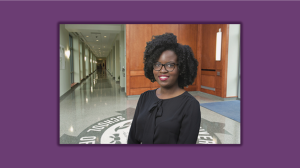Advancing Knowledge
Gabrielle Harris’s life was forever changed in November 2012. That was when her grandmother died suddenly from a stroke. It was also when she made an important career decision that she hopes will ultimately make lives better for stroke survivors and their families.
The unexpected loss was truly devastating for her family. Harris’s grandmother had cared for her and her sister as children while their parents worked, instilling lessons on love and compassion that Harris says she still carries with her today. “My nana was the rock and heart of our family,” she says.
An undergraduate nursing student at Winston-Salem State University (WSSU) at the time, Harris already knew she wanted to help others, possibly as a researcher. But her grandmother’s passing helped solidify her choice.
“The loss fueled my desire to become a nurse researcher even more,” Harris says. “I was determined to do my part to help those affected by stroke.”
She went on to pursue a master’s degree in the Family Nurse Practitioner degree program at WSSU. While there, she became a scholar in the Bridge to Doctorate Program. A partnership between WSSU’s Division of Nursing and Duke University School of Nursing, the unique program prepares advanced practice minority nurses to transition to the PhD in nursing program at Duke.
Now a Duke nursing PhD student, Harris studies stroke recovery and parenting in young stroke survivors. The incidence of stroke is increasing among young adults, which Harris describes as those under the age of 55. She says not enough is being done to help this population successfully return to their roles as parents during recovery. She hopes her research will change that.
“Right now, the literature focus is on return to work. But there are a lot of other things in their lives that they value that is not addressed throughout their recovery.”
Using research methods that include questionnaires and interviews, Harris seeks to add to the literature and eventually help researchers and clinicians better understand and address the unique challenges facing young stroke survivors.
She recalls interviewing a survivor who felt her personality, emotions, and relationship with her children drastically changed after suffering a stroke. “Before, she was really organized,” Harris explains. “Now she’s always rushing. She’s unable to work. She also has a lot of anger. She has to find ways to deal with that so it doesn’t affect her children.”
Since coming to Duke in 2015, Harris has had the chance to present her research at national conferences and was selected to participate in the Jonas Nurse Scholar program. She recently published her first article in the Journal of Stroke and Cerebrovascular Diseases.



